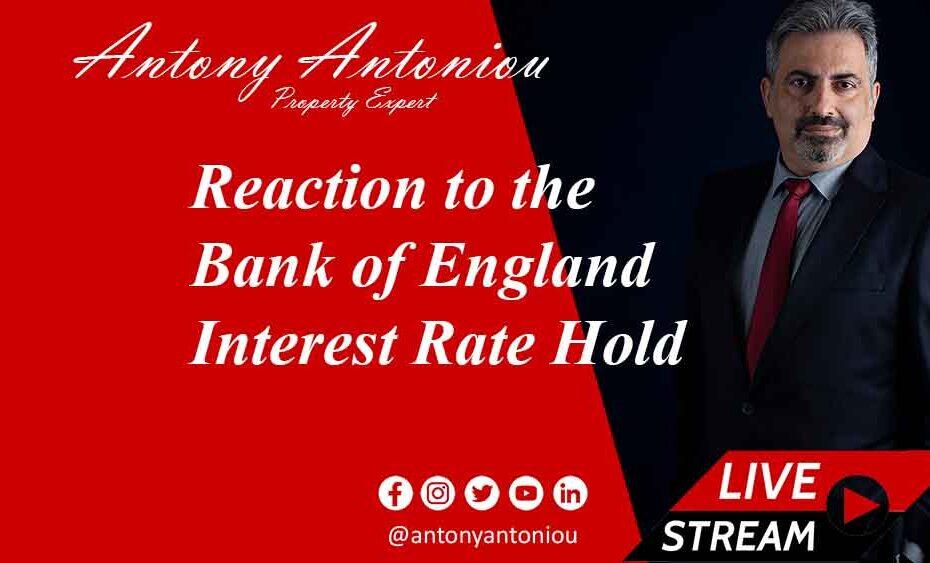Reaction to the Bank of England Interest Rate Hold
The Bank of England’s Ongoing Incompetence
The latest decision by the Bank of England’s Monetary Policy Committee (MPC) to hold interest rates at 5.25% is yet another sign of the shocking incompetence we have witnessed from the Bank over the past year.
Governor Andrew Bailey and the other MPC members seem to lurch from one bad decision to another with no clear strategy or accountability for the consequences on struggling households and businesses. Just when we need competence and empathy from the Bank of England, we have been saddled with potentially the worst leadership since the disastrous decisions of the early 1990s recession.
Too Slow to Spot Rising Inflation Risks
This all started when the MPC were far too slow to spot the warning signs of rising inflation last year. Despite mounting evidence of global supply chain pressures and surging energy and food costs, they persisted with the view that higher inflation would be “transitory”. This complacency meant they failed to raise interest rates quickly enough to get ahead of the inflation curve.
While hindsight is 20/20, it was the Bank’s job to have the foresight to anticipate these risks and take preemptive action. Yet they sat on their hands until inflation was already surging at nearly 10%, forcing them into panic mode.
Overzealous Interest Rate Hikes
This complacency was then followed by a period of overzealous interest rate hikes as the MPC desperately tried to regain credibility. This saw Bank Rate raised from just 0.1% in December 2021 to over 5% by November 2022. An unprecedented 2.35 percentage point rise in just 11 months.
While raising rates was clearly necessary to control inflation, the MPC went too hard for too long. Nine consecutive rate hikes between December 2021 and November 2022 was economic overkill.
The pace and magnitude of the hikes surpassed what most economists viewed as appropriate and has jeopardized the UK’s economic recovery from the pandemic.
Refusing to Change Course Despite an Economic Downturn
Now we are starting to see the damaging consequences of the Bank’s monetary policy decisions on the economy. Job losses are mounting, the housing market is stalling and leading economic indicators point to a recession this year.
Yet even with inflation showing signs of having peaked and the economy turning down, the Bank persists with their zealous tightening of monetary policy. They refused yet another opportunity today to reverse some of their unnecessary interest rate hikes.
Where is the Accountability or Self-Reflection?
At every stage of this debacle, Governor Bailey and the other MPC members have refused to acknowledge their mistakes or be held publically accountable.
There has been no self-reflection on why they got their inflation calls so wrong last year or why they persisted with an overzealous pace of rate hikes as the economy deteriorated.
It smacks of sheer arrogance and a lack of empathy for the livelihoods they have damaged through their incompetence. Especially when Governor Bailey could flippantly tell the nation to accept being poorer. What happened to the Bank of England’s responsibility to shield households from economic shocks not amplify them?
The Need for An Independent Review
In my view, there clearly needs to be an independent review into the Bank of England’s monetary policy decisions over the last two years.
We need to understand why they got things so wrong and what needs to change in future. Whether that relates to the Bank’s governance, leadership, forecasting capabilities, communications or something else.
Without an transparent, independent review and Accountability, public trust in the Bank of England will continue deteriorating. And we cannot afford to have anything less than full confidence in the institution charged with stewarding UK monetary policy and financial stability.
Conclusion
The Bank of England’s mishandling of interest rates over the last year has damaged public trust, slowed the UK’s economic recovery from COVID and caused significant distress for households and businesses.
They have stumbled from complacency to panic without a coherent strategy in between. It will likely go down as the worst period of national monetary policy mismanagement since the disastrous decisions that exacerbated the early 1990s recession.
With the UK economy teetering on the brink of another downturn, it is imperative that the Bank of England pauses its interest rate hiking cycle and launches an independent review. Otherwise, they risk causing even more damage through their ongoing incompetence.
Summary
The Bank of England’s monetary policy decisions over the past year have been incompetent and damaging:
– They were far too slow to respond to surging inflation in 2021, displaying significant complacency.
– Once they did act, interest rates were hiked aggressively without regard for economic conditions.
– Despite a cooling economy, they refuse to admit mistakes or reverse interest rate hikes.
– Governor Andrew Bailey has shown arrogance and lack of empathy for struggling households.
– An independent review is urgently needed into the Bank’s failings on inflation forecasting and policy decisions.
– Public trust in the Bank of England risks being eroded without accountability and competence.
– The Bank’s interest rate hikes may have already tipped the UK into an unnecessary recession.
Ultimately, the Bank of England has stumbled through 2022 without a coherent monetary policy strategy. In the process, they have damaged the UK’s recovery from COVID-19 and caused significant economic pain.
Rebuilding confidence and competence in the Bank’s leadership is now essential to avoid an even more severe downturn. The first step should be an transparent, independent review into what went so clearly wrong.

